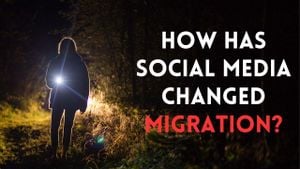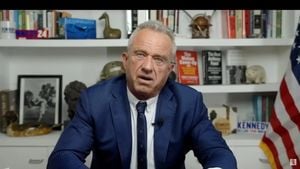Children as young as nine years old are now facing police investigations for what are termed "non-crime hate incidents" (NCHIs). These incidents, which some critics argue are trivial, have surfaced through various reports highlighting the response of law enforcement to relatively common classroom disputes.
The most shocking example involves a nine-year-old boy who reportedly called his classmate a “retard.” Another incident logged by police focused on two secondary school girls who said another student smelled “like fish.” These children are part of the thousands being investigated across Britain for similar incidents, as revealed by a Freedom of Information request from The Times.
Government guidance stipulates NCHIs should only be recorded when they are clearly driven by intentional hostility and pose a real risk of escalation to potential harm or criminal offenses. Despite this, authorities seem confused about enforcement rules, often blurring the lines between acceptable schoolyard banter and hate speech.
From June 2023 to June 2024, over 13,200 hate incidents were recorded by police across the UK, raising concerns about the appropriateness of these investigations, particularly when they involve children. Many argue these resources could be allocated more effectively, focusing on real criminal behaviors rather than childish insults.
Some police forces have expressed frustration over the vague guidance, particularly with classroom incidents. Both Humberside and West Yorkshire police were noted among those investigating cases where simple remarks—often made without malicious intent—were logged as NCHIs.
Adding to the controversy, prominent journalist Allison Pearson recently made headlines after police visited her home on Remembrance Sunday. She faced scrutiny for making what police termed racially charged statements on social media over the previous year. Pearson's case involved three major police forces and sparked outrage from various public figures, including former Prime Ministers and Elon Musk, who decried this as governmental overreach.
Conservative officials have highlighted how such investigations could deter free speech and create unnecessary fear within the community. Critics like Chris Philp, Shadow Home Secretary, argue the police should return their focus to serious crime rather than targeting individuals for expressing opinions or engaging in light-hearted banter.
Prime Minister Sir Keir Starmer's office has indicated the government will reassess the current guidance on recording non-crime hate incidents. This review aims to strike a balance, ensuring law enforcement can adequately address hate speech without infringing upon the fundamental right to free expression.
The reaction from the public has been intense, with many voices calling out the absurdity of involving police in routine schoolyard interactions. Individuals across political lines express alarm about how such overzealous policing might create long-term consequences for children caught up in these circumstances.
Supporters of the investigations argue there is merit to documenting these incidents if they help identify patterns of behavior early on, potentially preventing future violence. Critics, though, maintain this logic is flawed, claiming it unnecessarily criminalizes childhood behavior.
The debate over how to handle incidents of supposed hate speech is far from settled, with both sides presenting compelling arguments about the appropriate use of police resources and the meaning of free speech. This dynamic situation has led to significant scrutiny of how law enforcement prioritizes its investigations and how societal norms around free speech are defined and protected.
Concerns over the interpretation of NCHIs bring about broader questions on the role of police and their response to what may simply be part of growing up. Incidents like these suggest it’s time for society to reflect on how children’s interactions are classified, and whether current guidelines truly serve justice or merely enforce overreach.
While these discussions continue, one thing remains clear: the conversations surrounding free speech, childhood innocence, and policing methods are becoming ever more complex and contentious.



